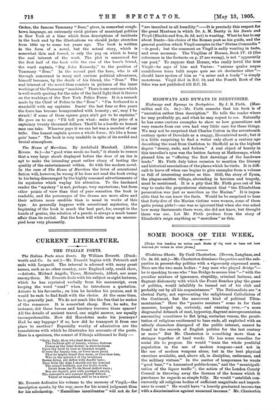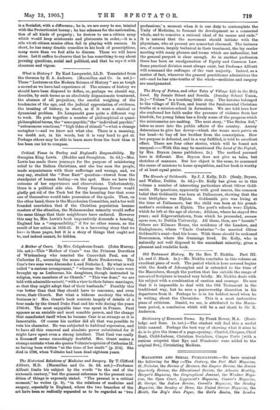SOME BOOKS OF THE WEEK.
[Under this heading we notice such Books of thi week as have not been reserved for IMAM in other forms.] Gladstone Ghosts. By Cecil Chesterton. (Brown, Langham, and Co. 2e. 6d. net.)—Mr. Chesterton dismisses the parties and the sub- parties in present-day politics with a vigorously expressed scorn. Here are the two main bodies : ." Any man who played Bridge"— he is speaking to one who "has Bridge to amuse him "—"with the peculiar mixture of ignorance, stupidi,ty, criminal laziness, and flagrant dishonesty with which the Front Benches play the game of politics, would infallibly be turned out of his club and probably. out by all his acquaintances." The Nationalists are "a clerical party, not representing the enlightened Catholicism of the Continent, but the narrowest kind of political Ultra- montanism." Here the "passive resisters" come in for their measure, heaped up, certainly, and running over,—" a more disgraceful debauch of cant, hypocrisy, flagrant misrepresentation amounting sometimes to flat lying, sectarian venom, the prosti- tution of religious excitement to base ends, all exploited with an utterly shameless disregard of the public interest, cannot be found in the records of English politics for the last century or more." But Mr. Chesterton is something more than a stringer together of hard words. He has some remedies for social ills to propose. He would "train the whole youthful population in the use of modern weapons—and not in the use of modern weapons alone, but in the best physical exercises available, and, above all, in discipline, endurance, and the military virtues." In the matter of temperance he wants "good beer," "a humanized public-house," and the "municipali- zation of the liquor traffic"; the action of the London CountY Council in throwing away the licenses of the houses which it purchases he regards as simple folly. He would "establish con- currently all religions bodies of sufficient magnitude and import- ance to count." He would have "a heavily graduated income-tax with a discrimination against unearned incomes." Mr. chesterton
is a Socialist, with a difference; he is, we are sorry to see, tainted with the Protectionist heresy; he has schemes for the nationalisa. tion of all kinds of property ; he desires to see a citizen army which would keep aristocrats and plutocrats in order,—it is a role which citizen armies often fail in playing with success. In short, he has many drastic remedies in his book of prescriptions, many more than we feel able to discuss. These we will leave alone. Let it suffice to observe that he has something to say about pressing questions, social and political, and that he says it with clearness and vigour.







































 Previous page
Previous page